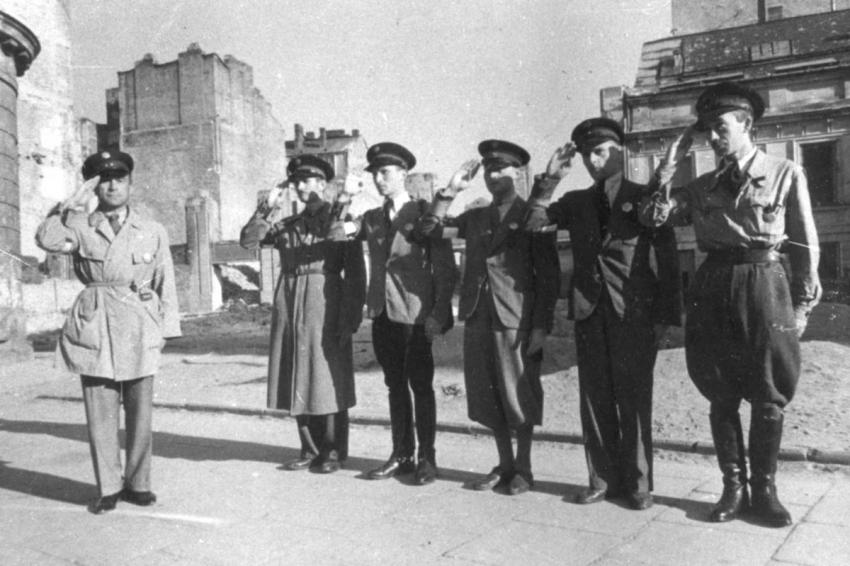The Jewish police (Jüdischer Ordnungsdienst) had been organized simultaneously with the establishment of the ghetto itself, and was comprised of some 2,000 volunteers who were primarily well-educated and upper-class young men looking for a way to survive. They did not request payment, and were even expected to pay in order to join. On 10 November 1940, Chaim Kaplan wrote in his diary:
"The Judenrat is burdened with much other work in preparing to organize life within a closed ghetto. Under its supervision a Jewish police force is being recruited which will have authority over the buried-alive Jews of the ghetto. Nine thousand young men have already registered as candidates for this force. By the way, each applicant included a five-zloty registration fee, which even the abject poor paid in the hope of being accepted for the ghetto police."
The Jewish police was first organized in order to direct traffic, supervise garbage collection and sanitation in the buildings, prevent crime and preserve order within the ghetto. However, in 1941 they were charged with providing workers for forced labor, and in the summer of 1942, were made responsible for gathering Jews for deportation during the mass deportations from Warsaw to Treblinka.
On 13 May 1942, Kaplan wrote:
"The decree concerning 'labor camps', which are merely a preparation for death, has been renewed. Since the day when war with Russia broke out, the camps had been idle and the ghetto had quietened down. Now the edict has been renewed. There is weeping and wailing in every house. The Judenrat was ordered to supply 1,500 youths, and the Jewish police began to make the rounds of the candidates' doors during the night. Their coming was accompanied by cries and wails, but the police, in spite of their being Jewish, harden their hearts and do their duty…. Instead of 1,500, 2,000 are taken out of their home; 1,500 are turned over to the Nazis, 500 set free after paying a ransom to the Jewish police."
The Jewish policemen were faced with a complex dilemma. They were promised immunity from the deportations for themselves and their families, and many believed that in fulfilling the orders, they were helping save Jewish lives. By participating in the roundups, they would help to limit their scope by preventing individuals exempt from deportation from being deported regardless of the papers in their possession. Additionally, they felt that if the German units themselves were to carry out the deportations, they would be much more brutal and merciless than the Jewish police.
The participation of the Jewish police in the roundups led to their being the most hated group within the Jewish community of the ghetto. As the roundups continued and the police realized they were simply a tool in the hands of the Germans, that their own fates were insecure, many deserted the ranks of the Jewish police, trying to join the workshops in the ghetto or going into hiding. In response, strong measures were taken against the Jewish police, forcing them to either meet the daily quota of Jews to be rounded up or their relatives would be taken to fill the quota. On 21 September 1942, Yom Kippur (the Day of Atonement), the final day of the mass deportations from Warsaw, the vast majority of the Jewish police and their families were deported to Treblinka and murdered. In the downsized ghetto, in which some 50,000 Jews out of almost half a million remained, approximately 200 Jewish policemen were left after the deportations.
Yad Vashem Photo Archives 3168/7b; Courtesy of Dortmund Polizeiarchiv







